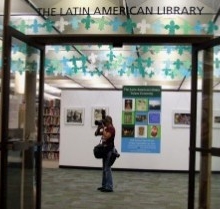4th floor Howard Tilton Memorial Library

lease join us for a work-in-progress talk titled, “Nueva cronología del modelo primario-exportador de Honduras, 1880-1930/A New Chronology of the Primary Commodity Exports Model in Honduras, 1880-1930” by Rafael Ledezma, the 2017-2018 Richard E. Greenleaf Fellow at the Latin American Library.
The talk will be in SPANISH. All are invited for refreshments afterwards.
Resumen
Las explicaciones convencionales sobre la historia política y económica de Honduras sostuvieron que, entre 1880 y 1930, el país fue un simple exportador de banano, y que su economía nacional no se benefició de este sector porque fue controlado por empresas extranjeras (United Fruit Co, Cuyamel Fruit Co y Standard Fruit Co). No sorprende, por lo tanto, que a Honduras se le haya conocido como la ‘banana republic‘ por excelencia. En esta ponencia presentaré, como hipótesis, una nueva cronología de la historia hondureña de ese periodo, que consiste en tres fases que definieron modos distintos de vinculación al mercado internacional, y que van más allá de la comercialización del banano. Ahondaré en aspectos tales como la actividad marítima y portuaria, con cuáles otros países, además de Estados Unidos, tuvo relaciones comerciales, y cuáles productos vendió y compró del exterior. Se seleccionó este periodo porque, recientemente, la historia económica en América Latina lo está estudiando desde distintos enfoques, para así aportar nuevas visiones sobre los problemas del desarrollo económico en el largo plazo, y los orígenes históricos de la desigualdad social en la región.
Abstract
Conventional explanations of the political and economic history of Honduras held that, between 1880 and 1930, the country only exported bananas, and that its national economy did not benefit from this sector because it was controlled by foreign companies (United Fruit Co, Cuyamel Fruit Co y Standard Fruit Co). It is therefore not surprising that Honduras has come to be known as the ‘banana republic' par excellence. In my talk, I will present as a hypothesis a new chronology of Honduran history of this period consisting of three phases that defined different modes of linkages to international markets and that go beyond the commercialization of bananas. I will examine issues such as maritime and port activity; the countries besides the United States with which Honduras had commercial ties; and the products that were bought and sold abroad. I chose to focus on this period because the economic history of Latin America has recently begun to be studied from new perspectives that have refocused our understanding of long-term economic development and the historical origins of social inequality in the region.
Rafael Ledezma hails from Costa Rica. He holds a Bachelor of Arts in History from Universidad Nacional in Costa Rica (2006); a Master‘s degree in Applied History from El Colegio de México (2016); and is currently a PhD candidate in History from that university. His research and publications focus on the history of agriculture and the environment in 20th century Costa Rica, and the economic history of Honduras between 1880-1930.
